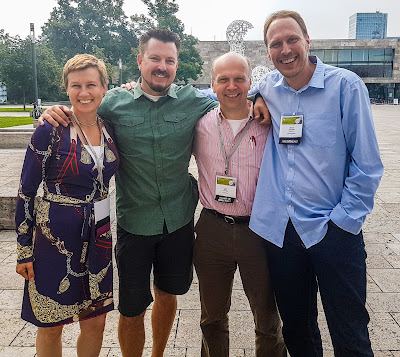ISEH March 2019 – Message from the President: Bertie Gottgens
 | |
| ISEH Presidents: Hanna Mikkola (2018), David Traver (2016), Bertie Gottgens (2019), Timm Schroeder (2017) |
Many of you will have seen that the call for abstracts is now open for our annual meeting at https://www.iseh.org/page/2019AbstractsandSpeakers. The official countdown to the 48th annual ISEH meeting has therefore begun. I am really excited by the program put together by our scientific Program Committee, chaired by Emmanuelle Passegué, with a superb line-up of speakers across the broad research interests of our membership (https://www.iseh.org/page/2019Program).
Please consider submitting an abstract and/or encourage others to do so. In addition to securing a place in one of the legendary poster sessions at ISEH, 33 of the submitted abstracts will be selected for oral presentation at the meeting. Having such a large proportion of talks selected from submitted abstracts is indeed a distinguishing feature of the ISEH meeting. As those of you who attend our meeting regularly will know, the abstract-selected talks often report the most-exciting and cutting-edge science, so please expect the current online program to receive a further boost when the abstract-selected talk slots get filled up.
There are a few additional exciting developments connected with our meeting that I want to make you aware of. Firstly, our awards committee has chosen this year’s winners of our Metcalf and McCulloch & Till prizes, with David Scadden and David Traver being the worthy winners. David Scadden will talk in the opening session, and David Traver in the closing session. Their plenary lectures will therefore provide perfect bookends for our meeting program, given that both are not only outstanding scientists but also long-term supporters of the society. Secondly, the New Investigators Committee has chosen Marella de Bruijn as the plenary speaker for “their” session, which I am very pleased about as it not only recognizes Marella’s excellent track record in developmental haematopoiesis, but also her sterling effort in organising the pre-meeting workshop for our junior members, now for the 4th year running.
Thirdly, the ISEH leadership has been in discussions for a couple of years now to develop ways of partnering with EHA, the European Hematology Association. Although geographically restricted, EHA is much larger than the ISEH, and has a strong clinical focus, but is keen to develop links and explore potential synergies with the ISEH. For this year’s annual EHA meeting in Amsterdam as well as our own ISEH meeting in Brisbane, there will be joint ISEH-EHA sessions, where the speakers for Brisbane will be Tony Green and Timm Schroeder, past presidents of EHA and ISEH respectively. For next year’s ISEH meeting in New York, we are planning to build on this, by having a joint ISEH-EHA session with two senior as well as two junior speakers, to cover a topical subject from both basic and translational perspectives, all within a single session.
The final aspect of this year’s meeting that I want to draw your attention to is the new Junior Faculty Grant Writing Workshop (see https://www.iseh.org/page/2019JuniorPI). This is a new initiative aimed at junior faculty, who have not yet received their first independent grant (e.g. USA R01, European ERC or equivalent). The workshop will be limited to 12 participants, who will receive training and mentorship in grant writing skills, as well as in reviewing grants-in-progress of a peer group. We ideally want them to leave the program with a network of peers willing to provide regular constructive grant feedback as well as a grant ready to submit for funding. I know from my own grant writing experience how valuable and indeed essential it is to discuss your grant and get feedback from colleagues, both within your immediate research field, but importantly also from beyond. I therefore want to encourage our junior PI members to take advantage of this new initiative, not just because of the valuable training aspects, but also to build a network of colleagues willing to provide constructive critiques of future grant ideas and applications.
In closing, I want to add to this last point about building networks. The ISEH is a very friendly society, which promotes its junior members and encourages interactions across its entire membership. This only works for us because of the huge amount of time given up by all the volunteers serving on our various committees and ad-hoc working groups. I am enormously grateful for all their hard work and unwavering enthusiasm. I also want to encourage you to get in touch if you have ideas on how we can further enhance interactions and inclusivity within our society. I hope that for many of you ISEH will then do what it has done for me, which is not just be a forum to build a network of scientific contacts and collaborators, but a community to build long-lasting friendships.
It is in this spirit that I hope to see as many of you as possible in Brisbane in August.
Bertie Gottgens DPhil, FMedSci
Professor of Molecular Haematology
Cambridge University Department of Haematology
Cambridge Institute for Medical Research &
Wellcome - MRC Cambridge Stem Cell Institute




Comments
Post a Comment